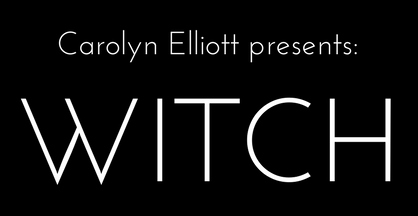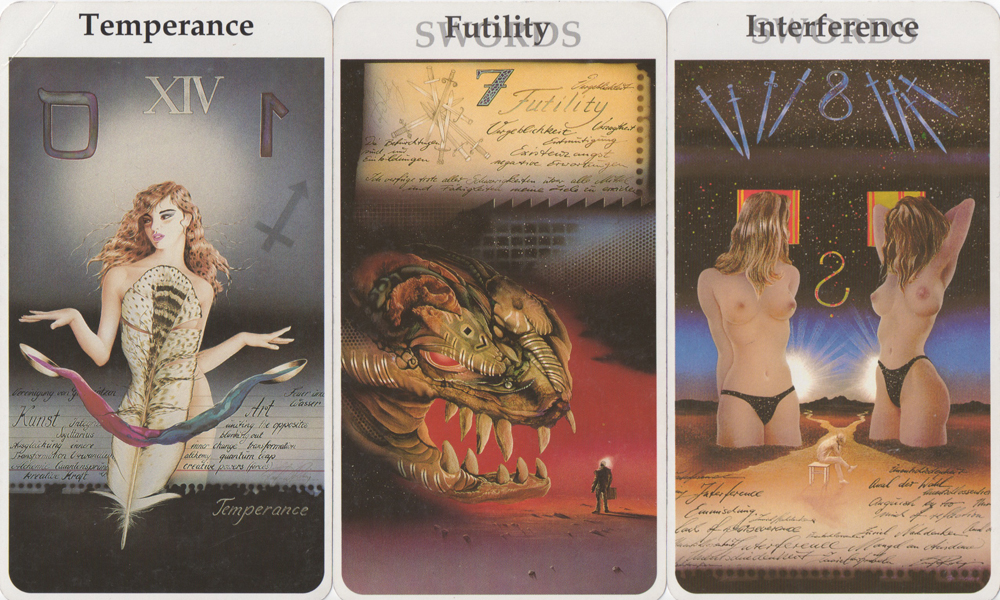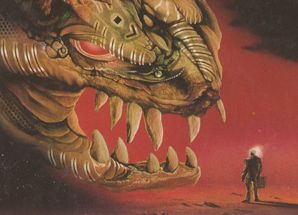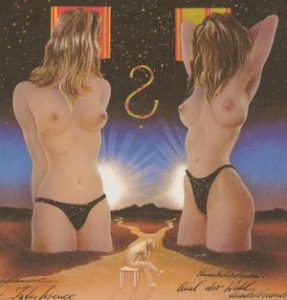Week of July 18, 2016
My, what machinations of the mind do we have here?
What tricks and entrapments, what intimidations and torture devices?
What subversive temptations of gargantuan proportions to hold you in place, and hypnotise you into a standstill with their projections and distortions?
Swords may be associated with the mind, but they have the ability to concretise into reality readily — and so it seems this is happening here, with you, or at the very least in your environment.
We’re going to take a look at the two Swords cards first, because they are currently operational. The card on the left comes later. You’ll see why.
As I wrote, Swords correspond with the mind; they are your thoughts, your beliefs, your speech, what you tell yourself, and what you tell others.
These then take shape in the tangible world.
Here, specifically, they are the thought patterns you default to, and the ones that hold you hostage.
Sevens tend to be an internal experience: the Seven of Wands is the battle the ego has with the uprisings of energy from the unconscious; the Seven of Cups is making a choice (though there is only one true choice); the Seven of Pentacles is nurturing something devotedly against all odds.
The Seven of Swords is a confrontation with the demon of Futility — the one that has you by the balls, who breathes the stale breath of nihilism, that tells you it holds all the power, and you do not.
As an internal experience, this is you pitted against yourself. Yes, as always, this beast may take shape in someone or something else, but it has its genesis in you.
It is the trickster super-ego who keeps you on edge, the thought that stops you in your tracks and tells you that past here you cannot go.
Why? Because “How dare you?!” That’s why.
But, really, who do you think you are? How do you think yourself and your world into shape? Because one step further, and this is concretised into the Eight of Swords.
The Eight of Swords is the point where your thoughts create a standstill.
In a parody of Rodin’s The Thinker, the small figure in the Eight of Swords is not so much lost in thought but lost because of thought.
In a land of forgetfulness of true path, he sits, minuscule against the backdrop of two heavy-breasted but faceless women.
If this isn’t the mother complex, then I don’t know what is.
Yes, we get into tricky territory here, but that’s the point. This territory is tricky. It’s tricksy.
It is the distortion of a truth, a longing that has lost its compass, a dredging of the past into the present, a superimposition of one thing on something else. It is the substitution of an authority figure, a guiding light, that is not fully owned but still projected onto another someone.
The mother who has become a whore; the whore who is a grotesquerie of mother. What is attractive is simultaneously a cause of deep disquiet.
Because these things take up so much internal real-estate, our hero/ine — you, dear hero/ine — is less inclined to see beyond them.
However, the mishmash of active, imposing memories/mammaries (what feeds us, whether by nourishing, by subverting, or by withholding) are the necessary waypoints to finding a new relationship with oneself, and so with others.
Through their contrast, we can start to see what lies beyond them, what is not them.
In other words, when you are able to see with some detachment how your thinking is often not reflective of the true state of things, you will begin to see what’s really going on.
So, now, look.
Two paths, apparently, with two Suns at the end of each.
But we know there is only one Sun.
The illusion falls away when you discover that there is only one true way, and in so doing, the imbalance can be restored to balance.
The card to the left of this reading is the one that was at the top of the deck when I first picked up my beloved Röhrig this morning. I didn’t even need to turn it over to know what it was: it’s the only card with a dog-ear.
When I saw it, I whispered, “Hello, Temperance,” put it back into the centre of the deck, cut it, and riffle-shuffled seven times.
Of course, I knew it was going to appear in the reading no matter how many times I shuffled, and here it is, in the perfect position.
Temperance is card 14 in the Tarot’s Major Arcana. Called Art in some other decks, it is the card of growing up because it describes the paradoxical state of creating a third way out of the holding of two opposing forces.
I also like to think of it Matrix-style, illustrating the concept of the blue pill and the red pill.
“You take the blue pill, the story ends. You wake up in your bed and believe whatever you want to believe. You take the red pill, you stay in Wonderland, and I show you how deep the rabbit hole goes.” ~ Morpheus
“You wake up in your bed and believe whatever you want to believe.” You can keep believing the same story you’ve been telling yourself time and again to hold yourself in place (and it may well be a story you’re whispering to yourself — a voice so quiet you’ve never thought to question it).
You can choose to feel held by the confusion of indecision you feel.
Or you can choose the paradox.
This paradox is a tension.
It is a tension between experiencing the confines of a particular set of beliefs that have kept you limited to patterns and fears, and between the call of the unknown.
It is a tension between what is boringly familiar, frustrating and enervating — and between the Mystery.
You step on the path, your double-vision disappears. But first you must step.
It takes a willingness to take the path less travelled by. It is a willingness to hold true to the one you know nothing about at all — apart from the fact that it is there, and its Soulful call to you smells, tastes, and feels like freedom.
Time to wake up.
About the Author:
You can find Sarah at her website Integrated Tarot, and on Facebook.
Astrology Correspondences: Temperance (Sagittarius), Seven of Swords (Moon in Aquarius), Eight of Swords (Jupiter in Gemini)
[Cards: Temperence, Seven of Swords, Eight of Swords from The Röhrig Tarot deck, created by Carl-W. Röhrig © US Games, Inc.]
Merken



